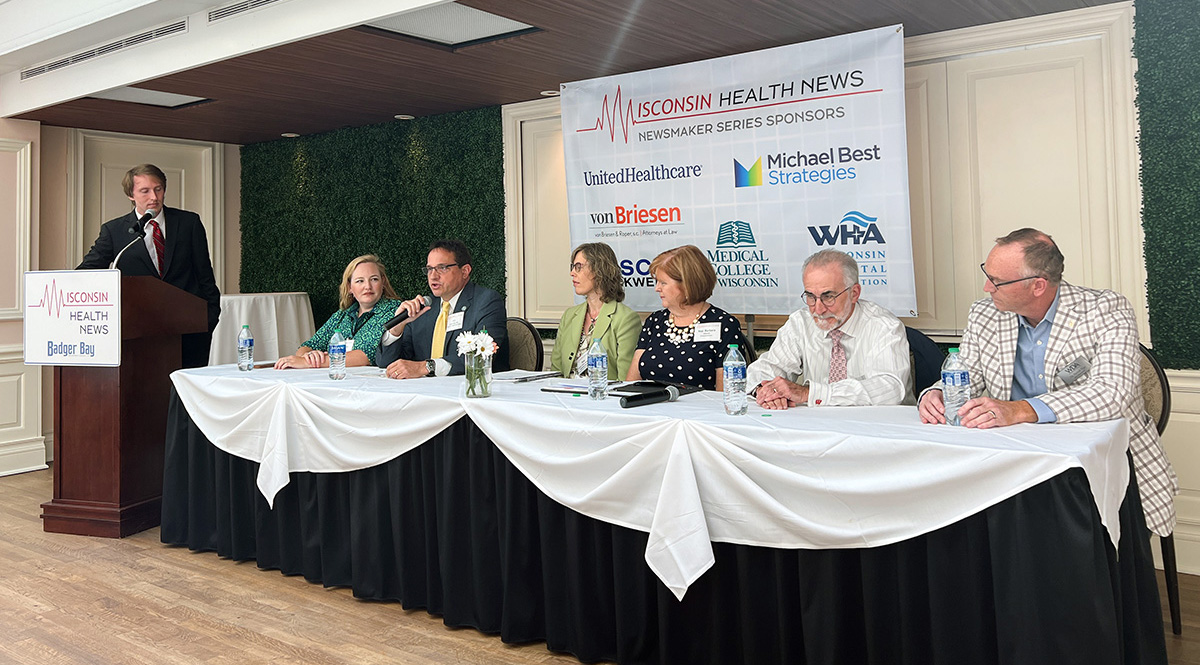WHA President and CEO Eric Borgerding joined a
Wisconsin Health News panel in Madison Aug. 8 to discuss Wisconsin’s 2023-2025 state budget and what it means for Wisconsinites’ health care.
Borgerding kicked off the panel discussion by sharing the challenges Wisconsin hospitals are facing with the workforce and post-pandemic difficulties. He explained that Wisconsin hospitals are struggling to find health care workers due to demographic trends.
 L to R: Moderator Sean Kirkby, Assistant Editor, Wisconsin Health News; Sen. Kelda Roys, D-Madison; Eric Borgerding, President and CEO, Wisconsin Hospital Association; Tami Jackson, Public Policy Analyst and Legislative Liaison, Wisconsin Board for People with Developmental Disabilities; Rep. Barbara Dittrich, R- Oconomowoc; Rick Abrams, CEO, Wisconsin Health Care Association and Wisconsin Center for Assisted Living; Patrick Tepe, DDS, Legislative Advisory Committee Chair, Wisconsin Dental Association.
L to R: Moderator Sean Kirkby, Assistant Editor, Wisconsin Health News; Sen. Kelda Roys, D-Madison; Eric Borgerding, President and CEO, Wisconsin Hospital Association; Tami Jackson, Public Policy Analyst and Legislative Liaison, Wisconsin Board for People with Developmental Disabilities; Rep. Barbara Dittrich, R- Oconomowoc; Rick Abrams, CEO, Wisconsin Health Care Association and Wisconsin Center for Assisted Living; Patrick Tepe, DDS, Legislative Advisory Committee Chair, Wisconsin Dental Association.
Borgerding went on to talk about the current budget, explaining that the Wisconsin Hospital Association has a responsibility to advocate for the best possible budget to meet the state’s health care needs.
“This budget included overdue investments for health care, such as increases for Medicaid reimbursement, which now comes at an apt time as the cost of delivering health care has gone through the roof,” said Borgerding.
Borgerding explained that the targeted funding increases in the new budget will have a great impact on inpatient behavioral health units within hospitals, helping ease access issues that are affected by reimbursements. He also talked about the lasting impact of the current budget that supports access to primary care across the state, especially for underserved populations.
Borgerding closed by reemphasizing Wisconsin’s health care workforce challenges. He expressed that Wisconsin leaders need to ensure the state’s current workforce and its workforce of tomorrow – students of today – are adequately prepared to meet Wisconsin’s health care demands. One such way to accomplish this will be by finding alternative approaches to health care services that take place outside hospitals.
“Only some of health care’s challenges can be addressed legislatively. We cannot buy our way out of some of these problems,” said Borgerding. “We need to look at specific changes to the health care system, such as appropriate health care settings that meet the needs of the patient,” he added.